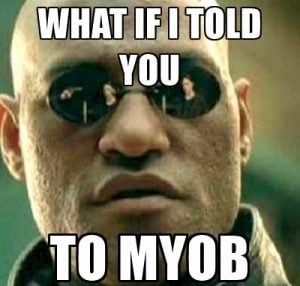 Who’s really bad in today’s HR Technology world?
Who’s really bad in today’s HR Technology world?
- Companies that actually spend money on software that peeps at employees and people they want to recruit?
- HR Technology companies that make the software?
- Investors who could be gambling their cash away in Monte Carlo? (And seeing a show?)
- HR executives who brag that they’re peeping at employees who might be doing the nasty nasty with some other employer?
Who’s Bad?
A reader sent me this gem today, from the Washington Post:
This software start-up can tell your boss if you’re looking for a job
I’d love your take on it. I see a few things in the story of Joberate, a company that:
“scrapes publicly available data from millions of individuals’ online social media accounts, or buys it from other parties, to assign what it calls a ‘J-Score’ that estimates their level of job search activity, likening it to a FICO score.”
(Yuck. Digital dumpster diving. Scraping the bottom. Bad.)
First, I’d love a list of Joberate’s customers — so I could advise you to quit your job there if you have one, because who wants to work for a company that invests more in peeking at what you’re doing than it does in making sure you’re a happy employee? But alas, Joberate’s customers don’t want to be identified. (Ah… busted doing the nasty nasty… send the PR manager into fits!)
Second, I’d like five minutes with the HR jokers who convinced their companies to buy into this tracking technology: Where are you hiding? Don’t you have a real job?
Third, I have a few words for “Brian Kropp, who leads human resources consulting for CEB, which has a venture capital arm that’s an investor in Joberate”: You’re an HR executive and an investor? Do you write HR Technology software?
Finally, to Joberate’s chief executive, Michael Beygelman: Close scrutiny and analysis of public media (I did a big-data dump of the Washington Post and ran it through my algorithm) reveals you should be looking for a new job, even though you’re not. Or maybe you are. Someone could check. If anybody cared.
HR Technology + LinkedIn = Really Bad
I always check out people worth writing about. Mr. Beygelman’s LinkedIn profile reveals something you really ought to care about. (Hey, it’s a public profile, anybody can look at it without scraping anything.) He wrote an article titled “LinkedIn changes to InMail policy create business case for Joberate technology.”
Here’s the nugget:
“Instead of sending blind InMails to potential candidates on LinkedIn, recruiters can now use Joberate technology to track job seeking behavior of people they’re interested in contacting.”
HR can be bad with Joberate, but LinkedIn helps recruiters be really bad. Now you’re going to see where all those silly LinkedIn In-mails you get from “headhunters” come from — an algorithm that links up Joberate with your favorite junk-mail purveyor:
“When Joberate technology tells the recruiter that a person’s J-Score went up, it means that person’s job seeking behavior has increased, alerting the recruiter when it becomes the ideal time to contact a potential candidate. At that point a recruiter can send an InMail to a prospective candidate whose job seeking behavior and activities have just increased.”
Whoo-wee! Thanks to HR Technology, a recruiter (or your boss — whoever pays for Joberate!) found you looking for a job! Kinda like looking in your peephole.
Who’s bad?
Would you hire Michael Beygelman? Would you invest your money with Brian Kropp? Do you worry Joberate is watching you? Is it time to turn off InMails on your LinkedIn account? Do we really need more software companies?
: :

 I passed all of the pre-employment testing in the 95th to 100th percentile. I cleared the background, credit, reference, education and employment verifications and was told I was “cleared” as per the conditions of my signed offer letter.
I passed all of the pre-employment testing in the 95th to 100th percentile. I cleared the background, credit, reference, education and employment verifications and was told I was “cleared” as per the conditions of my signed offer letter. In the end, I win because I still have an amazing job (I am currently employed and not unhappy) and I have the opportunity to secure a position with an organization that will not play games with me after already determining I meet their requirements.
In the end, I win because I still have an amazing job (I am currently employed and not unhappy) and I have the opportunity to secure a position with an organization that will not play games with me after already determining I meet their requirements. Back in July I applied for a design job with Connections Education. I got an email from their HR rep:
Back in July I applied for a design job with Connections Education. I got an email from their HR rep: Nick’s Quick Reply
Nick’s Quick Reply What would you do if you were interested in a position that clearly states:
What would you do if you were interested in a position that clearly states: I just delivered a webcast for Kelly OCG, produced by HCI.org, to hundreds of HR folks from around the world — about how to add value to the recruiting and hiring process at their companies.
I just delivered a webcast for Kelly OCG, produced by HCI.org, to hundreds of HR folks from around the world — about how to add value to the recruiting and hiring process at their companies. I was offered a job with a small tech company. The NCA that they asked me to sign was so broad that it would have prevented me from taking a job with any other company writing embedded software. When I balked at signing it, they told me I would have to talk to to someone in their legal department.
I was offered a job with a small tech company. The NCA that they asked me to sign was so broad that it would have prevented me from taking a job with any other company writing embedded software. When I balked at signing it, they told me I would have to talk to to someone in their legal department.